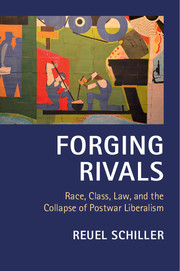Book contents
- Frontmatter
- Dedication
- Epigraph
- Contents
- Acknowledgments
- Introduction: Legal History and the Death of Postwar Liberalism
- 1 Forging Postwar Liberalism
- 2 Ed Rainbow's Problem
- 3 The Phony Commission
- 4 A Tale of Two Propositions
- 5 1966: A Terrible Year for George Johns
- 6 “The Day of the Minstrel Show Is Over”
- 7 Forging Rivals, Shattering Liberalism
- List of Abbreviations for Archival Sources
- Notes
- Index
4 - A Tale of Two Propositions
Published online by Cambridge University Press: 05 April 2015
- Frontmatter
- Dedication
- Epigraph
- Contents
- Acknowledgments
- Introduction: Legal History and the Death of Postwar Liberalism
- 1 Forging Postwar Liberalism
- 2 Ed Rainbow's Problem
- 3 The Phony Commission
- 4 A Tale of Two Propositions
- 5 1966: A Terrible Year for George Johns
- 6 “The Day of the Minstrel Show Is Over”
- 7 Forging Rivals, Shattering Liberalism
- List of Abbreviations for Archival Sources
- Notes
- Index
Summary
During the early fall of 1958, Lester Bailey, a labor organizer and field representative of the Citizens' Committee against Proposition 18, found himself engaged in an unusual activity as he sat in the committee's offices on Sutter Street in San Francisco. He was writing a song: “The Right to Work Blues.” “I'd hate to see / My weekly pay go down,” Bailey wrote.
I'd hate to see
That Right to Work Made law!
Because the day it is
They'll pay me like they paid my Paw!
Mississippi has it
Georgia, Texas do!
If it comes to California
I'll have to leave here too!
Oh I'd hate to see
That Right to Work made law
Cause I can't live on
What they paid my Paw!
Got the Right to Work Blues
Scared as I can be!
I'm goin' to vote NO! on 18
And keep California free!
By choosing an African American musical idiom – the song was to be sung to the tune of W. C. Handy's immensely popular “St. Louis Blues” – Bailey hinted at the identity of his intended audience. The substance of his lyrics also suggested that it was the black voters of California whom he wished to convince to oppose Proposition 18, the right-to-work proposition that would be on the November ballot. African American workers had left the South to come to California in search of the prosperity that had been denied to their parents. Yet the passage of Proposition 18 would bring the South to them, Bailey argued. It would undermine their prosperity and force them to move on once again to preserve both their material comfort and their freedom.
Les Bailey was not the only trade unionist reaching out to the African American community during the 1958 campaign. Indeed, he was part of a concerted effort to ensure that black voters would reject Proposition 18. This effort came into being because the proponents of the proposition had targeted the African American community. They believed that black workers, many of whom had suffered discrimination at the hands of labor unions, could be convinced to vote for a ballot measure that would weaken organized labor in the state.
- Type
- Chapter
- Information
- Forging RivalsRace, Class, Law, and the Collapse of Postwar Liberalism, pp. 120 - 157Publisher: Cambridge University PressPrint publication year: 2015



